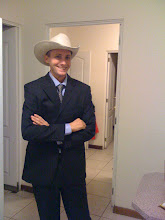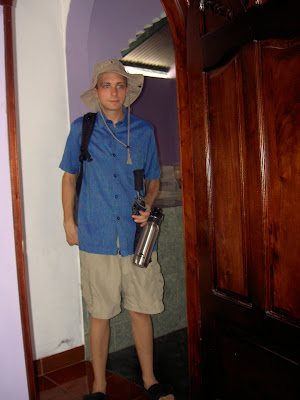Screaming children…dirty diapers (or finding your niece in a puddle, as was my luck on Saturday)…getting hit…ruined furniture. Goodnight kisses…hugs good-bye…singing lullabies…learning to talk …playing games. It’s a tough call…something to anxiously look forward to and rush into as fast as possible or something to dread and put off until, well…until that maternal or paternal instinct does whatever it does to make us forget about that first part.
There’s no doubt I’m in the “waiting” camp. Waiting…until I am no longer in school. Waiting…until I have a real job. Waiting…until I won’t pull my hair out regretting having put myself in that position (granted, at the rate I’m going, I won’t need to worry because there will be nothing to pull out).
The sudden urge to express my thoughts on childrearing entered my mind for a few reasons. I finally spent a few hours alone with my niece the other day, which gave me a better taste of what having a child is really like…on second thought one could call it a misconception because it was only a few hours until she was no longer my problem. But I also help take care of her when her cousin is here as well. The two together is much more challenging because the word share is simply not yet part of their vocabulary. Going through the famous “terrible-twos” stage, they demand everything (and unfortunately are accustomed to getting it) and must EACH receive a toy when Min (their name for me, since they can’t say Benjamin) brings back any toys from his travels. I was getting somewhere this weekend, when Wendy and I were playing with them, passing a little man on a skateboard back and forth, but it did not last long, as my niece would throw a tantrum every time her cousin received the toy. Someone remind me what age you’re supposed to start learning how to share!
As many of you know, I’ve begun a personal growth process. The main focus I’ve taken is eliminating negative thinking and behavior (gossiping, even if we try to call it an intelligent discussion between two rational adults about someone we happen to not like being the most important of those behaviors) because in the last year my efforts to minimize these two things have made me so much more happy. An important part of this process, for me, is how we interact with children. Their bonding and love for us is good for ourselves (the limbic system, specifically, according to the latest book I’m working through) as well as for them because unconditional love is what they need more than anything. For exactly this reason, I take notice of everything I see, perhaps in an effort to recognize what not to do as well as things I see here I wouldn’t have imagined in the States that are probably extremely beneficial to a child’s development.
Volunteering in a public health clinic, a big proportion of the patients I see are children under ten. Most of them are the most misbehaved children you can imagine. From what I see, discipline consists of hitting, belittling (calling them dirty instead of acknowledging behavior that could get them sick or is “socially unacceptable,” for example), or the easiest by far to do – permitting the bad behavior and giving in to the children’s demands.
When I see that such negative energy does nothing to help the child, I can’t help but ask myself what the best thing to do is. I’m certainly no expert, I’m in no position to criticize, and I know that bad behavior needs to be corrected, but how to do it? Here was one idea I had. Excellent, theoretically, if I do say so myself…but it didn’t quite work. My nephew likes to run around charging at people with a plastic stool. If he’s not charging full speed ahead with it out front, it’s on top of his head. Either way, it’s very dangerous and every so often, he falls and bangs up his face. I try to keep an eye on it and tell him not to do it, but he’ll just run away. One day, I decided to talk to him about it. Instead of screaming at him, as is the custom here, I grabbed him, putting my arm around his little belly – as is the easiest way to restrain a child, I’ve found, as it’s so much more loving than violently grabbing their wrist – and stopped him. “Why are you running around with that stool on your head?” Laughter. “Anderson, you can’t run around like that because you can fall and hurt yourself! Remember when you fell the other day because you were running around with this?” He seemed to remember and even seemed to be responding that he wanted to fall. Since then, whenever he sees me and notices there is a stool nearby, he picks it up and runs around with it exactly in the manner I don’t want him to do, just because he knows he’ll get me upset. So much for a rational adult conversation with a two year old, trying to explain rationally why he should do something for his OWN safety…
So…I ask…what is the right answer? There are so many traumatic things we can do to children when punishing them in a seemingly harmless way. But, how can a child know the difference between having an accident being called filthy because pee is dirty versus direct insults, leading them to believe THEY are filthy for having wet their pants? Or, what are they supposed to think, being called dirty, just for exploring their bodies…that part of their body is a dirty thing that can’t be touched or shown to anyone ever? I’ll keep practicing, hoping my guinea pigs don’t get too traumatized and that it’s nothing I’ve said that they have to carry into their adult life to work through. And as for me…there’s no doubt I’ll be waiting quite a while before having my own creatures to look after.





